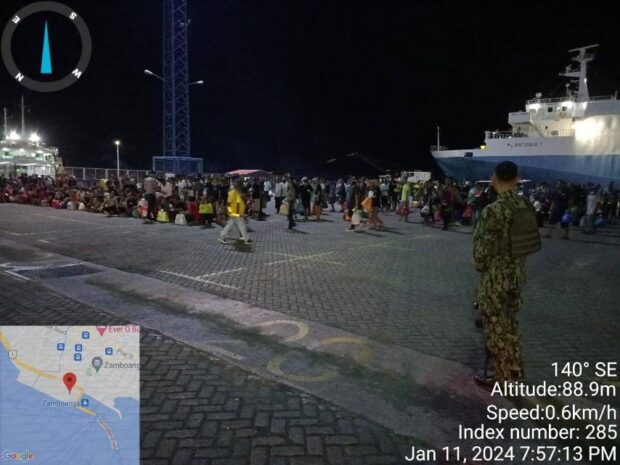Deported from Sabah, 680 Filipinos now in Zamboanga City

BACK IN PH SOIL | The 680 Filipinos deported from Sabah arrive in Zamboanga City on the night of Jan. 11, 2024, and are now sheltered at the Department of Social Welfare and Development (DSWD) facility in the city. (Photo from the Zamboanga Peninsula Police Regional Office)
ZAMBOANGA CITY, Zamboanga del Sur, Philippines — Nurhiya (not her real name), 43, clutched her small bag of belongings as police escorted her inside the Processing Center for Displaced Persons, one of the facilities of the Department of Social Welfare and Development (DSWD) in Barangay Mampang here.
She was among the more than 600 Filipinos who arrived here from Sabah, on the night of Jan. 11, after they were fetched there by MV Antonia, a Filipino-owned commercial vessel owned by Aleson Shipping Lines plying the route of Zamboanga to Sabah, said Police Brig. Gen. Bowenn Joey Masauding, director of the Zamboanga Peninsula Police Regional Office (PRO 9), whose office provided two trucks to get the deportees from the Zamboanga port to Mampang.
With mixed emotions, Nurhiya said she was glad that her ordeal inside a Sabah jail finally ended, but she was anxious as her two children, ages 20 and 18, were still left in the care of her friend in Sabah.
“They didn’t know I was already deported,” said Nurhiya, who had been in jail in the last eight months after she was arrested for failure to show her working permit.
Her children were also working as unspecified helpers in Malaysia.
Article continues after this advertisementThe deportees had all been previously arrested in Sabah for lack of work permits or for illegal entry, according to DSWD which facilitated the Filipinos’ return to their country.
Article continues after this advertisementThe PRO 9 said there were 703 deported Filipinos on board MV Antonia but the DSWD here said they only counted 680 deportees.
Ivan Eric Salvador, spokesperson for DSWD in Region 9, did not give the deportees’ places of origin but he said the majority came from different areas in the Bangsamoro region.
The deportation process is a DSWD program that began in 2013, which is undertaken as a cooperation between Sabah and the Philippines.
Rewarding task
“The arrival of the first batch of returning Filipinos this year means that we do not just sit and watch but take action in alleviating the sufferings of our brothers and sisters,” said Masauding in a statement.
“I commend all personnel for their tireless work and effort. Remember that serving is a fulfilling experience and is incomparable to any award that you’ll ever receive,” he added.
Personnel from the Regional Mobile Force Battalion 9, Regional Logistics and Research Development Division, and Regional Community Affairs and Development Division secured the returning Filipinos as truck vehicles fetched them from the Zamboanga City port area and brought them to the DSWD facility.
Nurhiya said that from the boat that took them from Sabah, they were made to board big trucks that brought them to the DSWD facility. They were also examined to ensure that no one among them were carrying infectious diseases while in jail.
“I will try to contact my children as soon as I can,” she said. “I will work and save, get a working permit and return to Sabah again,” Nurhiya added in Tausug.
Salvador, however, told the Inquirer there were 680 returning Filipinos and not 703 as earlier reported by the police, who must have also counted some other passengers that boarded the same vessel.
According to Salvador, of the 680 who returned, 541 were male adults, 85 were female adults and 54 were minors who included 27 males.
In 2023, DSWD 9 also served 6,409 returning Filipinos from Malaysia, who were all sent back to their respective hometowns, he said.
Partners
Two days after the repatriation of Filipinos from Sabah, Foreign Affairs Undersecretary for Civilian Security and Consular Affairs Jesus Domingo visited Western Mindanao Command (Wesmincom) to discuss with the military the displacement of Filipinos in Sabah.
Although the meeting was held closed-door, Westmincom released a statement saying that Domingo had sought the help of the military in the documentation of Filipinos in Sabah and in enhancing civilian security and consular affairs in the region.
His proposal included collaboration and information exchange to sustain efforts and to prevent violent incidents from happening in Mindanao.
Brig. Gen. Aldrin Annani, Westmincom deputy commander, assured Domingo that “Westmincom is open for partnership to boost border control and prevent illegal migration and other transnational crimes.”